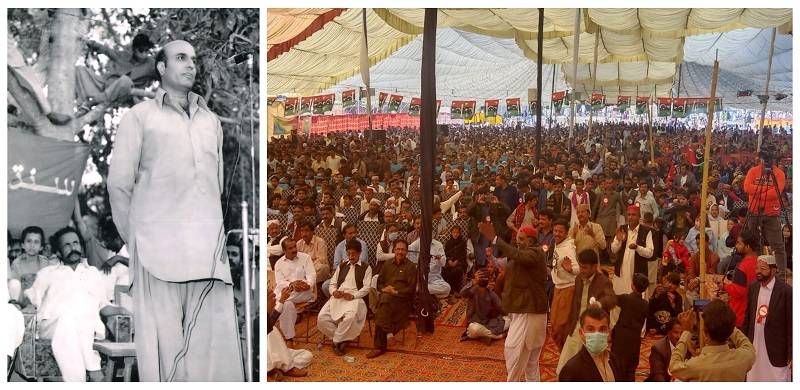
Iconic peasant leader Mohammad Fazil Rahu was remembered on the 35th anniversary of his death at a ceremony in Rahuki in Badin district on Monday. Politicians, poets, and writers gathered at the late Fazil Rahu’s village to pay him homage.
Senior Pakistan People’s Party (PPP) leader and former Chief Minister Sindh Syed Qaim Ali Shah told the audience that Fazil Rahu was one of only a few leaders who had devoted his entire life for the rights of farmers, peasants and the working class.
"Fazil lived and died for the people of Sindh and the rights of all underprivileged classes” the former chief minister said, reminiscing that he lived and died as a ‘brave man.’
An outspoken leader for the country’s poor and laboring classes, Fazil Rahu was imprisoned several times throughout his lifetime. He also served as senior vice president of the Awami National Party (ANP). Fazil Rahu was assassinated in January of 1987.
The late leader's son is current Sindh Minister for Agriculture Mohammad Ismail Rahoo, who is also a member of the PPP. During his speech at the ceremony, he said that his father stood firm against the rule of two dictators, despite all odds. He recalled that his father was at the forefront of the Movement for the Restoration of Democracy (MRD), along with Benazir Bhutto, during General Zia’s rule.
“My father never left [Benazir Bhutto]. While in the worst situation, most of her so-called aides had distanced themselves from her,” Rahoo said.
Ismail Rahoo lashed out at Pakistan Tehreek-e-Insaf (PTI) for their ‘anti-people policies and plans.’ He alleged that the prime minister and his aides were trying to ‘snatch the morsels from the mouth of the people and pushing the country towards the darkness.’
Also in attendance, Special Assistant to Chief Minister Sindh Pir Noorullah Quraishi recalled that Fazil Rahu was a great leader of the poor and always worked for them. Quraishi said that there was a need to follow in the footsteps of great leaders like Fazil Rahu, who fought for the restoration of democracy at the cost of his life.
Senior Pakistan People’s Party (PPP) leader and former Chief Minister Sindh Syed Qaim Ali Shah told the audience that Fazil Rahu was one of only a few leaders who had devoted his entire life for the rights of farmers, peasants and the working class.
"Fazil lived and died for the people of Sindh and the rights of all underprivileged classes” the former chief minister said, reminiscing that he lived and died as a ‘brave man.’
An outspoken leader for the country’s poor and laboring classes, Fazil Rahu was imprisoned several times throughout his lifetime. He also served as senior vice president of the Awami National Party (ANP). Fazil Rahu was assassinated in January of 1987.
The late leader's son is current Sindh Minister for Agriculture Mohammad Ismail Rahoo, who is also a member of the PPP. During his speech at the ceremony, he said that his father stood firm against the rule of two dictators, despite all odds. He recalled that his father was at the forefront of the Movement for the Restoration of Democracy (MRD), along with Benazir Bhutto, during General Zia’s rule.
“My father never left [Benazir Bhutto]. While in the worst situation, most of her so-called aides had distanced themselves from her,” Rahoo said.
Ismail Rahoo lashed out at Pakistan Tehreek-e-Insaf (PTI) for their ‘anti-people policies and plans.’ He alleged that the prime minister and his aides were trying to ‘snatch the morsels from the mouth of the people and pushing the country towards the darkness.’
Also in attendance, Special Assistant to Chief Minister Sindh Pir Noorullah Quraishi recalled that Fazil Rahu was a great leader of the poor and always worked for them. Quraishi said that there was a need to follow in the footsteps of great leaders like Fazil Rahu, who fought for the restoration of democracy at the cost of his life.

